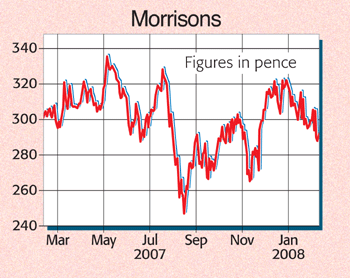
As the saying goes, “one swallow doesn’t make a summer”. And in the cut-throat world of the £128bn UK grocery market, one season does not make a retailer. Let me explain…
Morrisons (MRW), upgraded to OVERWEIGHT by Morgan Stanley
In March 2004, Morrisons bought Safeway for £3.4bn, becoming the UK’s fourth-largest supermarket chain. But integrating the two businesses proved much harder than expected, leading to profit warnings and resignations. However, under new chief executive, Marc Bolland, things have improved.
Like-for-like sales rose 9.5% (excluding fuel) over Christmas, ahead of its rivals, and 2% above City forecasts. The growth was aided by better product availability, wider choice and a £14m marketing blitz featuring celebrities such as Lulu and Denise Van Outen. But this needs to be put into context. Revenues for the 39 weeks to 4 November were up only 3.1%.So even after Christmas, I reckon the full-year figure will be around 5%, which is down on the 6% seen in 2006.
Also, 1.5% of the rise was due to the introduction of a 10% discount scheme for its 120,000 employees. Finally, sales performance over the past few years has lagged that of its peers, so there must have been some element of catchup over Christmas as it harvested the “low-hanging fruit”. The real work lies ahead, as Morrisons tries to attract first-time shoppers and win their loyalty.
To management’s credit, performance has improved over the past three years. The fish/meat counters are excellent and the store layout is much sharper. But there remain some vital strategic gaps in its armoury. For example, there is still no online delivery service. Nor does the group have a significant footprint in the rapidly-growing convenience-store sector. It has also been fairly slow to develop its non-food range.
And perhaps most worrying is the relentless pressure from its rivals. Tesco, Sainsbury’s and Asda will undoubtedly redouble their efforts by lifting quality, cutting prices and beefing up advertising – potentially hurting Morrisons’ future profit margins and expansion plans.
Given the risks, I would rate the group on a 14 times 2008 p/e multiple, giving a fair value of around 225p per share, or nearly 30% below current levels. The bulls argue that Morrisons is a defensive stock, but I believe this hefty premium is unjustified for a number-four player in a highly-competitive industry. Yes, its freehold stores are worth about £6.6bn – but after allowing for net debt (£566m) and the pension deficit (£167m) – this still only equates to a fair value of 220p. And with commercial property presently in freefall, this underpinning of the stock price is vulnerable.
Lastly, in light of the current difficulties faced in funding leveraged buy-outs, the chances of any near-term takeover are remote. Full-year results are out on 13 March 2008.
Recommendation: TAKE PROFITS at 299.5p
• Paul Hill also writes a weekly share-tipping newsletter, Precision Guided Investments